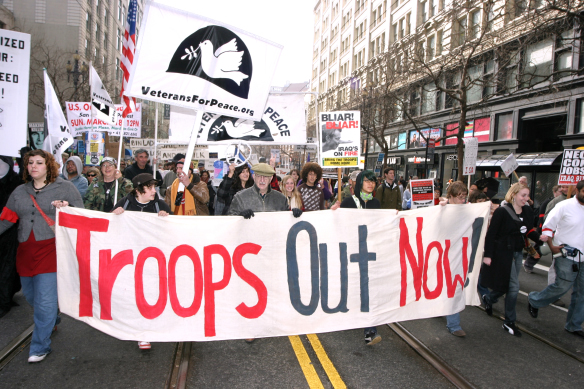 Her eyes are Palestinian
Her eyes are PalestinianHer name is Palestinian
Her dress and sorrow Palestinian
Her kerchief, her feet and body Palestinian
Her words and silence Palestinian
Her voice Palestinian
Her birth and her death Palestinian
The LEFT Alternative in Cardiff salutes Mahmoud Darwish who died this week. Adam Johannes writes in tribute.
Mahmoud Darwish was not only the poet of Palestine, but one of the great poets of the twentieth century. It is perhaps fiting that he died aged 67 - the same age at which Edward Said, the great intellectual of national liberation, bid farewell to life, and in the same year as George Habash. All three men died in exile, and all three were iconic figures of Palestinian nationalism. They formed part of a generation of giants forged in the afterglow of the 1968 battle of Karemeh and birth of the PLO, and their lives spanned the great epic of modern Palestinian history that rose from the ashes of 1948 when the land disappeared from the maps of the world. Tragically none lived to see freedom and justice restored.
In Darwish's writing Palestine was not only Palestine, but also the loss of Eden, the fall of innocence, birth and resurrection, dispossesion and exile, love and rage. Stripped of his Israeli 'citizenship', a citizenship he famously derided in his poem 'Identity Card', he spent most of his life in exile, he was a witness to the '82 Israeli invasion of Lebanon when Beirut with all its flowers came to smell of smoke and fire. Beirut was to be a pivotal moment for him, his poetry and the dream of Palestine. He left on the raft of a ship with other members of the Resistance for Tunisia.
One commentator captured the greatness of Darwish: "under house arrest, having his second-class citizenship revoked, being chased and hounded from one exile to another, being bombed in almost each of these exiles and living under countless sieges, Darwish's humanism never succumbed. One of his most popular poems, Rita, spoke of his love for a Jewish Israeli woman by that name; and about the absurdity of wars coming between lovers. This poem was made into a popular song by Lebanese musician Marcel Khalife."
His deep humanism was witnessed in his address to the Israeli soldiers shelling his neighbourhood during the 2002 siege of Ramallah,
You, standing at the doorsteps, come in
And drink with us our Arabic coffee
For you may feel that you are human like us
Darwish will also be remembered for his hand in crafting the 1988 declaration of independence, and the speech with which Arafat electrified the UN General Assembly in 1974, "Today I have come bearing an olive branch and a freedom fighter's gun. Do not let the olive branch fall from my hand. Repeat, do not let the olive branch fall from my hand". He has the good sense to reject the the sell-out of the Oslo frauds.
Towards the end of his life, he became dismayed at the division in the Palestinian house. Last summer in a bitter voice thick with irony, he was to declaim:
"We have triumphed . . . Gaza won its independence from the West Bank. One people now have two states, two prisons who don't greet each other. We are victims dressed in executioners' clothing. We have triumphed knowing that it is the occupier who really won. We have to understand - not justify - what gives rise to this tragedy.
It's not because they're looking for beautiful virgins in heaven, as Orientalists portray it. Palestinian people are in love with life. If we give them hope - a political solution - they'll stop killing themselves.
Sarcasm helps me overcome the harshness of the reality we live, eases the pain of scars and makes people smile . . .the sarcasm is not only related to today’s reality but also to history. History laughs at both the victim and the aggressor.
I will continue to humanise even the enemy... The first teacher who taught me Hebrew was a Jew. The first love affair in my life was with a Jewish girl. The first judge who sent me to prison was a Jewish woman. So from the beginning, I didn't see Jews as devils or angels but as human beings." [Several poems of his poems were to Jewish lovers] "These poems take the side of love not war"
This poem written during the siege of Beirut, contains a line that poignantly captures the deadlock of the Palestinian resistance - "Where do we go after the last frontier? Where does the bird fly after the last sky?". After armed struggle, appeals to international law and the conscience of the world, negotiations, peace processes. mass civil disobedience, Palestine still remains unfree:
The earth is closing on us, pushing us through the last passage, and
we tear off our limbs to pass through.
The earth is squeezing us. I wish we were its wheat so we could die
and live again. I wish the earth was our mother
So she'd be kind to us. I wish we were pictures on the rocks for
our dreams to carry
As mirrors. We saw the faces of those to be killed by the last of us in
the last defense of the soul.
We cried over their children's feast. We saw the faces of those who'll
throw our children
Out of the windows of the last space. Our star will hang up in mirrors.
Where should we go after the last frontiers? Where should the birds
fly after the last sky?
Where should the plants sleep after the last breath of air? We will
write our names with scarlet steam.
We will cut off the head of the song to be finished by our flesh.
We will die here,
Here in the last passage. Here and here our blood
will plant its olive tree.















No comments:
Post a Comment